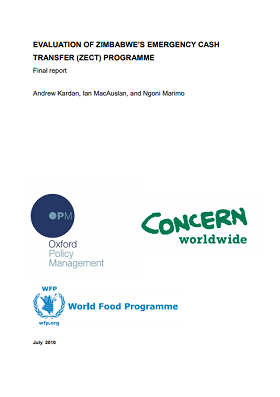Evaluation of Zimbabwe’s Emergency Cash Transfer (ZECT) Programme
Concern Worldwide have been delivering food aid in three rural districts of Zimbabwe (Gokwe North, Gokwe South and Nyanga) since 2002 as part of the World Food Programme’s (WFP) Vulnerable Group Feeding (VGF) programme. The VGF provided a monthly food bundle of 10kg staple, 1kg beans and 600ml oil per person to cover 80% of their monthly food needs, targeted on food insecure households (in 2009/10 approximately 40% of the population in selected wards) during the lean season (October-March) for a maximum of 6 months during the year.
In 2009, after the relative stabilisation of the Zimbabwean economic and political situation following hyperinflation and political stability, it was decided to make use of the introduction of the US dollar to pilot providing cash instead of food. This pilot project, called the Zimbabwe Emergency Cash Transfer (ZECT) programme, lasted for 4-5 months and operated in two wards of each of the three Concern VGF districts. Within each district, in one ward Concern distributed cash, whilst in the other ward a mixture of cash and food was distributed. Concern continued to provide food aid in other wards in each district.
This evaluation assesses the benefits and costs of the three different transfer types. The principal test is whether households receiving cash and cash + food were able to meet their food entitlements as effectively as those receiving food, understood in terms both of obtaining sufficient staple foods, but also having adequate dietary diversity.



